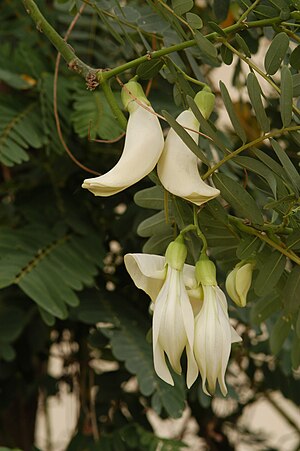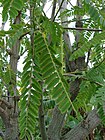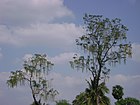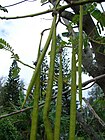Note: This is a project under development. The articles on this wiki are just being initiated and broadly incomplete. You can Help creating new pages.
Difference between revisions of "Sesbania grandiflora - Agasti"
(→External Links) |
(→How to plant/cultivate) |
||
| Line 56: | Line 56: | ||
==How to plant/cultivate== | ==How to plant/cultivate== | ||
| − | + | The plant is easily propagated by direct seeding, cuttings also easily sprout. | |
| − | = | + | <ref name="Cultivation details"/> |
| − | |||
| − | |||
| − | |||
| − | |||
| − | |||
==Commonly seen growing in areas== | ==Commonly seen growing in areas== | ||
Revision as of 11:52, 13 June 2019
Agasti Sesbania grandiflora is a short-lived, soft-wooded, loosely-branching tree with a rather open crown; it can grow 8 - 15 metres tall. The straight, cylindrical bole can be 25 - 30cm in diameter. A true multi-purpose tree, providing a range of foods, medicines, timber, gum and tannins, mainly for local use. The plant is cultivated in many tropical areas as an ornamental, a green manure crop, in soil reclamation schemes and for its many useful properties. It is sold as a vegetable in local markets.
Contents
- 1 Uses
- 2 Parts Used
- 3 Chemical Composition
- 4 Common names
- 5 Properties
- 6 Habit
- 7 Identification
- 8 List of Ayurvedic medicine in which the herb is used
- 9 Where to get the saplings
- 10 Mode of Propagation
- 11 How to plant/cultivate
- 12 Commonly seen growing in areas
- 13 Photo Gallery
- 14 References
- 15 External Links
Uses
Constipation, Diarrhea, Respiratory disorders, Food poisoning, Cracked feet [1]
Parts Used
Bark, Leaves, Flowers, Fruits, Root
Chemical Composition
Common names
| Language | Common name |
|---|---|
| Kannada | agasemara, agasi |
| Hindi | agast, agasti, |
| Malayalam | agatti, akatti |
| Tamil | agathi, agathi keerai |
| Telugu | agasi, agathi, bakapushpam |
| Marathi | NA |
| Gujarathi | NA |
| Punjabi | NA |
| Kashmiri | NA |
| Sanskrit | agasthya, agasti, kumbhayonih, munidruma, vakrapushpa, munitaru |
| English |
Properties
Reference: Dravya - Substance, Rasa - Taste, Guna - Qualities, Veerya - Potency, Vipaka - Post-digesion effect, Karma - Pharmacological activity, Prabhava - Therepeutics.
Dravya
Rasa
Tikta (Bitter)
Guna
Laghu (Light), Rooksha (Dry)
Veerya
Sheeta (cold)
Vipaka
katu (Pungent)
Karma
Pitta, Kapha
Prabhava
Habit
Identification
Leaf
| Kind | Shape | Feature |
|---|---|---|
| Pinnate | alternate | Leaves 18-30 cm long; leaflets 12-25 pairs, 1.5-3.5 x 0.6-1.2 cm, oblong, base rounded, apex obtuse, emarginate, glabrous to appressed-pubescent on both surfaces, glaucous beneath; stipules 5-8 mm long, ovate |
Flower
| Type | Size | Color and composition | Stamen | More information |
|---|---|---|---|---|
| Bisexual | racemes | Pale yellow/purple | 10 | Racemes to 8 cm long, lax, 2-4-flowered. Flowers 7.5-10 cm long, pendulous; pedicels to 2 cm long; bracts and bracteoles 3-4 mm long, linear-oblong. Calyx 2-3 cm long, campanulate; lobes triangular. Corolla pink or white, 7.5 -10 cm long; standard to 10 x 6 cm, reflexed. Staminal sheath 3.5-6 cm long. |
Fruit
| Type | Size | Mass | Appearance | Seeds | More information |
|---|---|---|---|---|---|
| A Pod | 30 - 45cm long, 5-8 mm wide | slender, falcate or straight. | Seeds c. 30, reddish-brown. | {{{6}}} |
Other features
List of Ayurvedic medicine in which the herb is used
Where to get the saplings
Mode of Propagation
How to plant/cultivate
The plant is easily propagated by direct seeding, cuttings also easily sprout. [4]
Commonly seen growing in areas
Photo Gallery
References
- ↑ Uses
- ↑ Vernacular names
- ↑ Botonic description
- ↑ Cite error: Invalid
<ref>tag; no text was provided for refs namedCultivation details
External Links
- Pages with reference errors
- Ayurvedic Herbs known to be helpful to treat Constipation
- Ayurvedic Herbs known to be helpful to treat Diarrhea
- Ayurvedic Herbs known to be helpful to treat Respiratory disorders
- Ayurvedic Herbs known to be helpful to treat Food poisoning
- Ayurvedic Herbs known to be helpful to treat Cracked feet
- Herbs with Bark used in medicine
- Herbs with Leaves used in medicine
- Herbs with Flowers used in medicine
- Herbs with Fruits used in medicine
- Herbs with Root used in medicine
- Herbs with common name in Kannada
- Herbs with common name in Hindi
- Herbs with common name in Malayalam
- Herbs with common name in Tamil
- Herbs with common name in Telugu
- Herbs with common name in Sanskrit
- Habit - Tree
- Index of Plants which can be propagated by Seeds
- Index of Plants which can be propagated by Cuttings
- Herbs that are commonly seen in the region of Tropical area
- Herbs
- Fabaceae
- Ayurvedic herbs that don't have seed photos






